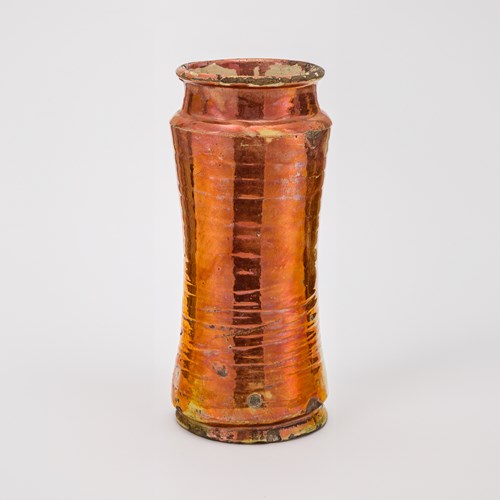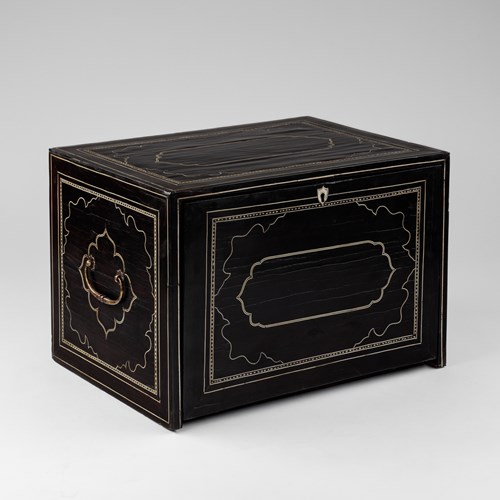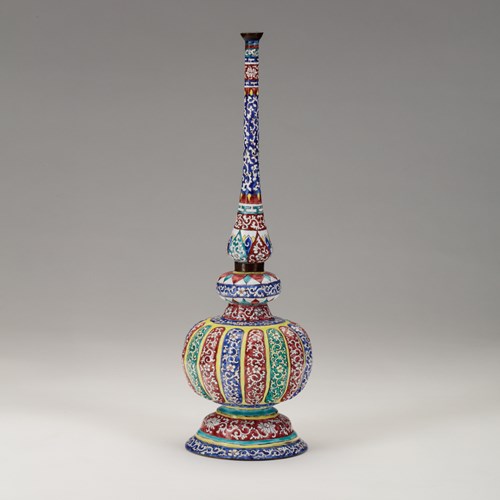Marketplace
A Study of a Female Asian Koel (Eudynamys scolopaceus)
A Study of a Female Asian Koel (Eudynamys scolopaceus)
Date c. 1800–1850
Period 19th century
Origin Calcutta, India
Medium Opaque colours and ink on paper
Dimension 47.3 x 32.1 cm (18⁵/₈ x 12⁵/₈ inches)
Made for the European market
Stock No.: A5324
This exceptionally refined work highlights the elegance of the female koel and captures her alert nature as she raises her head and casts her beady eye toward the viewer.
The plumage of the bird’s head and body is of mottled browns and greys, and the black wings are punctuated by white spots. Her three barred rectrices continue this sophisticated colouration.
Members of the cuckoo family, Asian koels are canny brood parasites; laying their eggs in other birds’ nests, where their chicks hatch first, commanding more attention from their host parents. Recently scientists have discovered that the female koel’s plumage specifically evokes that of a local raptor species, and by mimicking these birds of prey they scare off the would-be host birds and deposit one of their eggs in the unguarded nests.
Artistic prowess abounds in this work; subtle blending from brown to buff to grey and white, overlaid with minute wisps of black creates an exquisitely soft feel to the downy breast feathers. Further extraordinary detail appears within the glistening reflection in the bird’s eye and dash of pale pink at the edge of the beak, as though stained by the juice of a recently eaten forest fruit.
The work bears the 'Strasbourg Lily' watermark, which appeared on Dutch, German and English papers from the late 17th – 19th century. Below the bird is a Persian inscription, erroneously labelling it as a ‘ku’el nar (male Asian koel)’. To the right of this appears the album number ‘401’.
Bibliography:
Welch, Stuart Cary. Room for Wonder: Indian Painting During the British Period 1760–1880. American Federation of Arts, 1978.
Archer, Mildred. Natural History Drawings in the India Office Library. Commonwealth Relations Office, London, 1962.
Stock No.: A5324
This exceptionally refined work highlights the elegance of the female koel and captures her alert nature as she raises her head and casts her beady eye toward the viewer.
The plumage of the bird’s head and body is of mottled browns and greys, and the black wings are punctuated by white spots. Her three barred rectrices continue this sophisticated colouration.
Members of the cuckoo family, Asian koels are canny brood parasites; laying their eggs in other birds’ nests, where their chicks hatch first, commanding more attention from their host parents. Recently scientists have discovered that the female koel’s plumage specifically evokes that of a local raptor species, and by mimicking these birds of prey they scare off the would-be host birds and deposit one of their eggs in the unguarded nests.
Artistic prowess abounds in this work; subtle blending from brown to buff to grey and white, overlaid with minute wisps of black creates an exquisitely soft feel to the downy breast feathers. Further extraordinary detail appears within the glistening reflection in the bird’s eye and dash of pale pink at the edge of the beak, as though stained by the juice of a recently eaten forest fruit.
The work bears the 'Strasbourg Lily' watermark, which appeared on Dutch, German and English papers from the late 17th – 19th century. Below the bird is a Persian inscription, erroneously labelling it as a ‘ku’el nar (male Asian koel)’. To the right of this appears the album number ‘401’.
Bibliography:
Welch, Stuart Cary. Room for Wonder: Indian Painting During the British Period 1760–1880. American Federation of Arts, 1978.
Archer, Mildred. Natural History Drawings in the India Office Library. Commonwealth Relations Office, London, 1962.
Date: c. 1800–1850
Period: 19th century
Origin: Calcutta, India
Medium: Opaque colours and ink on paper
Dimension: 47.3 x 32.1 cm (18⁵/₈ x 12⁵/₈ inches)
Provenance: Paul Beilby Lawley Thompson, 1st Baron Wenlock (1784–1852)
More artworks from the Gallery


_T638760967371334545.jpg?width=2000&height=2000&mode=max&scale=both&qlt=90)






